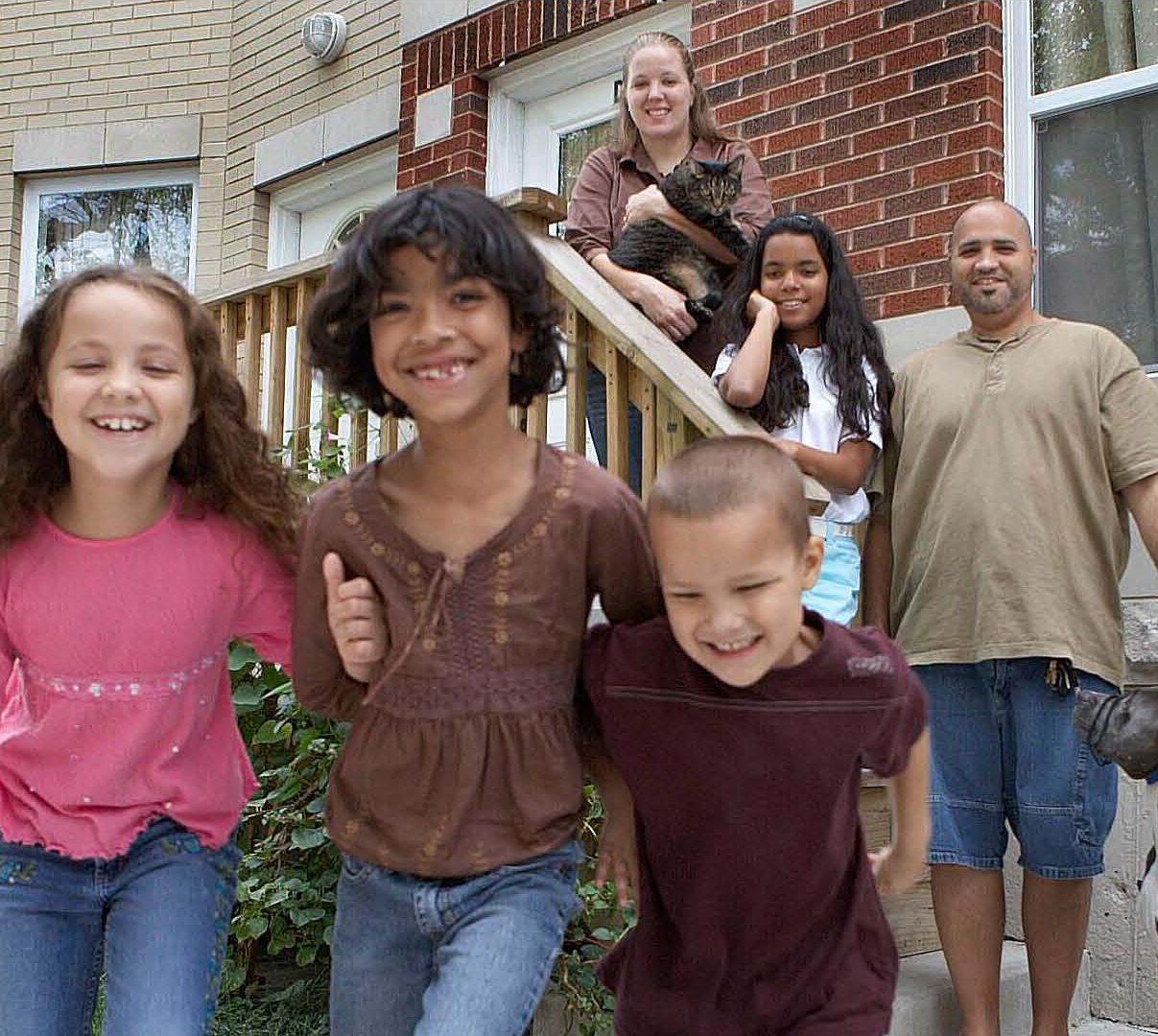Stephanie Platz discusses our Chicago-based grantmaking with a cross-cutting focus on equity in our communities.
Chicago in 2022 was a year of contrasts. The pandemic was not over, but many residents resumed their lives in community. Gun violence rates were decreasing but remained all too high, and dynamic community development projects launched in multiple neighborhoods, but with looming threats of gentrification. One major newspaper, the Chicago Tribune, was taken over by a hedge fund, and another, the Chicago Sun-Times, joined forces with Chicago Public Media to operate as a nonprofit entity alongside WBEZ radio. MacArthur’s local funding in 2022 touched these areas and more, with a unifying focus on equity. Across our programs, we awarded 133 grants totaling $29.4 million.
Chicago Commitment and Impact Investments
Founded by artist and social innovator Theaster Gates, Rebuild Foundation fosters arts, cultural development, and neighborhood transformation on Chicago’s South Side. Our Chicago Commitment and Impact Investments teams enthusiastically collaborated on a $1.7 million Program-Related Investment (PRI) to support Rebuild’s work which, combined with an earlier planning grant, will help Rebuild create an arts and creative entrepreneurship incubator on the South Side.
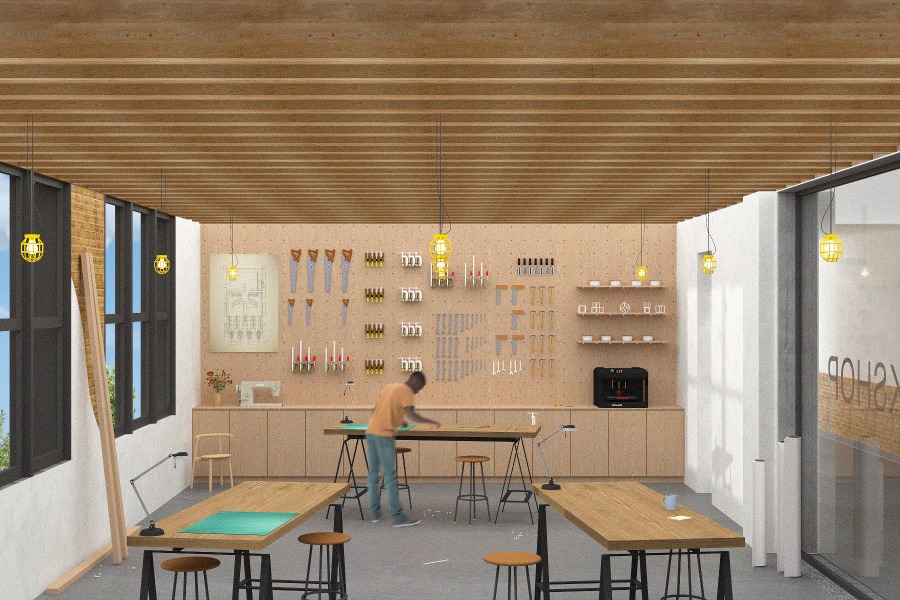
Rendering of workshop space at the St. Laurence arts and creative entrepreneurship incubator on the South Side. Image by Rebuild Foundation and Soca Design & Architecture.
It is often challenging for nonprofit organizations to access “pre-development” funds like these, which facilitate long-term planning for community projects that contribute to economic growth. We are actively developing similar combinations of PRIs and grants that will support community economic development in Chicago to be announced in 2023 and beyond. The investment in Rebuild Foundation builds upon a long history of MacArthur making Impact Investments in Chicago’s neighborhoods, including a total of just under $108 million committed through Benefit Chicago, a collaborative initiative undertaken with the Chicago Community Trust and Calvert Impact Capital.
Our commitment to economic development is closely tied to our funding for the arts. In September, we announced the next stage in our support for small and mid-sized arts organizations: a planning grant to the Field Foundation of Illinois to develop a re-granting program. This partnership builds on and deepens the equity goals of MacArthur’s Culture, Equity, and the Arts program. The Field Foundation will draw on MacArthur funds to offer multi-year general operating grants for small and mid-sized arts and cultural institutions in Chicago that have a strong commitment to equity. We look forward to sharing more detailed information once a grantmaking program is launched in the first half of 2023.
Simultaneously, we mutually and amicably agreed to wind down the long-standing partnerships we held with the Prince Charitable Trusts and the Richard H. Driehaus Foundation to support small and mid-sized arts organizations. We extend our deep gratitude to both Prince and Driehaus for their extraordinary partnership, through which MacArthur awarded a total of $65.6 million to 565 organizations between 2003 and 2022.
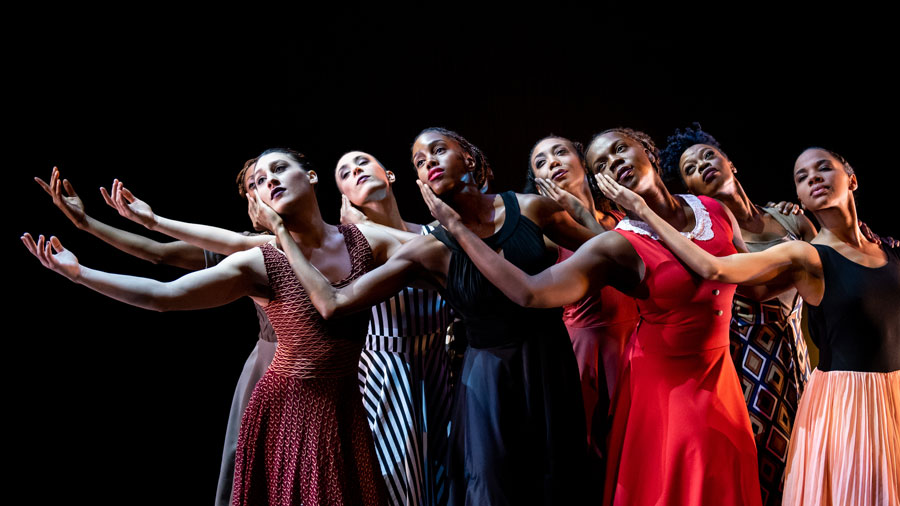
A contemporary dance performance at Deeply Rooted Dance Theater, a grantee of the former MacArthur Fund at the Richard H. Driehaus Foundation. Photo by Deeply Rooted Dance Theater.
We have supported additional re-granting efforts since 2016 through Civic Partnerships with dozens of entities—including city government, corporations, and other funders—to reduce gun violence and build trust between the city’s residents and its police officers. Our collaboration, called the Partnership for Safe and Peaceful Communities (PSPC), has committed more than $140 million since 2016.
PSPC identifies and supports community-led, evidence-based solutions that the public sector can scale as part of a comprehensive approach to addressing gun violence. These include violence interrupters who are active every day in preventing shootings and retaliation in our neighborhoods. We also support trauma-informed therapy and jobs programs for community members who are at risk of being involved in violence. This past year saw a decrease in the level of gun violence, with 697 homicides. This number represents a 13 percent decrease from 2021, when violence spiked during the pandemic, but it remains altogether too high. Our commitment to PSPC will remain and expand, as we continue to learn what fuels gun violence and what can deter it.
Criminal Justice
With the goal of community safety, the Criminal Justice team supported several initiatives designed to facilitate implementation of the PreTrial Fairness Act, which the Illinois legislature enacted in 2021. The law eliminates cash bail, a change that is designed to lessen racial disparities and decrease pretrial jailing in our state. Grants that supported effective implementation of the law include awards to the ACLU of Illinois and the Administrative Office of the Illinois Courts. On December 31, 2022, Illinois Supreme Court halted implementation of the Pre-Trial Fairness Act, which was slated to take effect on January 1, 2023. An appeal is pending.
Efforts aim to improve fairness and increase equity in Chicago and our state.
In 2022, the Criminal Justice team supported the John Howard Association of Illinois, which provides independent citizen oversight of the Illinois correctional system. It engages in objective reporting on facility conditions; collaborates with state agencies to solve problems; and plays a critical role in educating the public and decision makers about the real-world consequences of criminal justice policies. The Illinois Justice Project also established the Illinois Reentry Council, which will design and implement a more supportive, equitable, and effective process for people returning to the community from jails and prisons. These and other efforts aim to improve fairness and increase equity in Chicago and our state.
Journalism and Media
Last year included a strong focus on work to sustain local journalism and help local media thrive. MacArthur contributed multi-year funding to support Chicago Public Media as it acquired the Chicago Sun-Times, creating one of the largest nonprofit media organizations in the U.S. This new nonprofit model and partnership will strengthen the media landscape serving diverse communities in Chicago.
Our Journalism and Media (JAM) team renewed its partnership with the Field Foundation in support of its Media and Storytelling program, established in 2019. This initiative, which was informed by journalists and storytellers from communities of color, provides grants to a more diverse set of Chicago news outlets, reporters, and media makers to ensure stories of all Chicagoans are told accurately, fairly, and contextually. Since deepening its Chicago-focused grantmaking in 2018, JAM has committed $6 million over six years to support approximately 80 nonprofit media outlets and special reporting projects.
We made significant contributions to a number of local media outlets, including City Bureau, a Chicago-based journalism lab, and its project, The Future of Local News, a coalition of nonprofit newsrooms advocating for robust news ecosystems that prioritize equitable access to local news and information for all people. JAM also supported OTV, a platform for intersectional television, film, and video art that incubates, distributes, and exhibits the work of artists marginalized by society and from full participation in the commercial television industry.
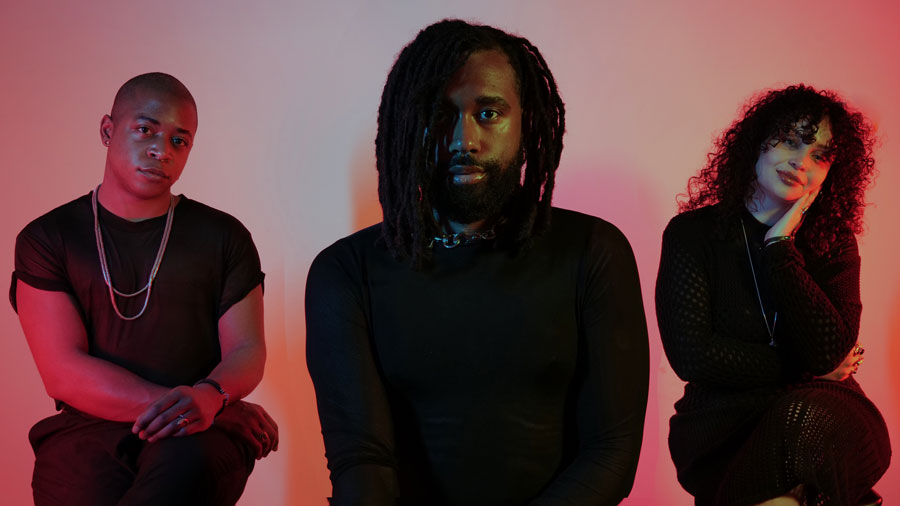
OTV is a nonprofit platform for intersectional television, film, and video art, which works to create a pipeline of artists to help diversify the television and film industries.
JAM also invested in Sisters in Cinema, a nonprofit organization that works to create opportunities for Black women and gender nonconforming people in media by providing programs designed to educate, raise the visibility of, and support and serve communities. It conducts its work both nationally and hyper-locally in Chicago. Its new Sisters in Cinema Media Arts Center in South Shore is scheduled to open in spring 2023. In addition, JAM supported The Pillars Fund, a nonprofit grantmaking organization whose mission is to amplify the leadership, voices, and talents of Muslims in the United States.
Climate Solutions
The short documentary No Climate, No Equity, No Deal, released in 2022, told the story of the enactment of the Illinois Climate and Equitable Jobs Act (CEJA). The film details how the Illinois Clean Jobs Coalition, a grassroots initiative from across the state of Illinois, lifted up the communities most affected by climate change and worked to educate the public on the need for equitable climate legislation.
In 2021, the Illinois Climate and Equitable Jobs Act (CEJA) was signed into law. No Climate, No Equity, No Deal is the story of how the Illinois Clean Jobs Coalition helped pass climate legislation through years of organizing, advocacy, and centering the communities most impacted by climate change.
Chicago Environmental Justice Network members are frontline, community-based organizations serving communities on the South and West Sides of Chicago that contend with severe health impacts due to being so close to sources of pollution. Through a grant to the Little Village Environmental Justice Organization, our ongoing support for the Network included resources to provide professional development opportunities to junior and administrative staff to help them build skills that benefit their organization’s mission.
The Climate Solutions team also supported Evergreen Climate Innovations, a nonprofit venture accelerator with a mission to deliver climate impact and inclusive opportunities in the Midwest. Evergreen Climate Innovations makes seed investments and provides hands-on support to climate entrepreneurs.
Special Awards to Welcome Asylum Seekers and Refugees to Chicago
In 2022, MacArthur joined many local organizations and governmental agencies in offering support to asylum seekers and refugees seeking protection in the Chicago metropolitan area. These include Ukrainians who fled as a result of the Russian invasion in February 2022 and Afghans who escaped the fall of Kabul in 2021 and continued seeking safety here through 2022. And they include migrants, many of whom are seeking protection from persecution, who have come to Chicago after being admitted at the U.S. southern border.
These grants reflect a total of $2.45 million awarded in 2022 to local organizations that are welcoming these new arrivals and helping them to secure housing, legal representation, and education. These awards do not signal a revival of MacArthur’s Migration program, which wound down at the end of 2016. Rather, they represent special grants to assist immigrant populations in the metropolitan area and to recognize the local entities that have responded with extraordinary generosity to their needs.
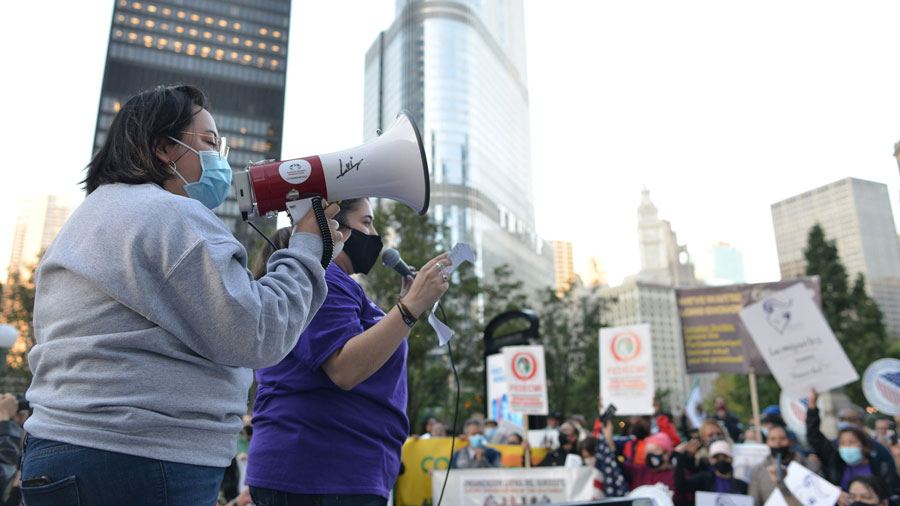
As part of an Asian Americans Advancing Justice-Chicago (AAAJC) initiative, youth organizer Chris Aldana led chants at a rally and march for Citizenship for All in downtown Chicago in October 2021.
Finally, in 2022, the Chicago Commitment also commissioned a study of Chicago’s shifting demographics. With more Asian American Pacific Islander (AAPI) communities calling Chicago home, we awarded six AAPI-led and -serving organizations a total of $3.65 million in grants to strengthen their work in the metropolitan area and advance the Chicago Commitment’s racial equity goals.
Forward Focus
We see our programmatic areas united by a cross-cutting focus on equity.
As we look ahead in 2023, we see our programmatic areas united by a cross-cutting focus on equity. We will continue to invest in initiatives that support pandemic recovery, creativity, and economic prosperity across the city’s communities. We will maintain our focus on justice by investing in systemic reform, such as the end to cash bail, sustainable reductions in gun violence, and equitable climate legislation. And we will work steadfastly to support the key cultural bulwarks of independent, local journalism and a thriving arts sector. We extend our gratitude to all who are engaged in these efforts and look forward to the work that lies ahead with our partners.






